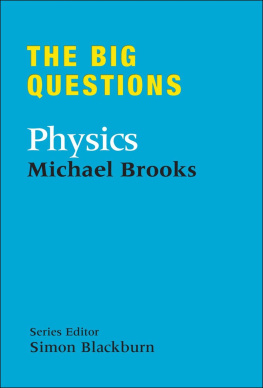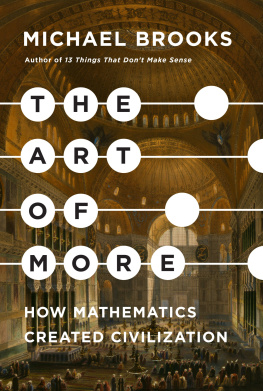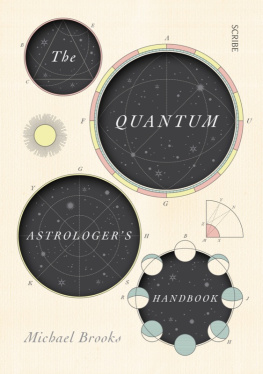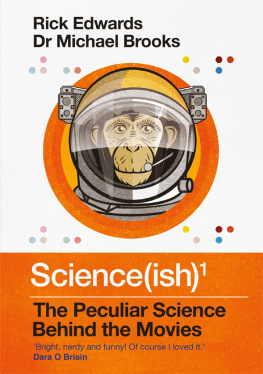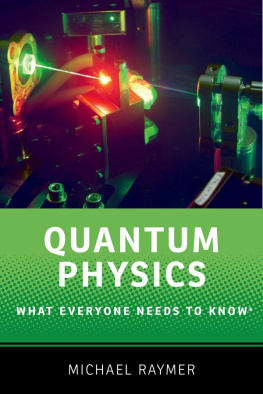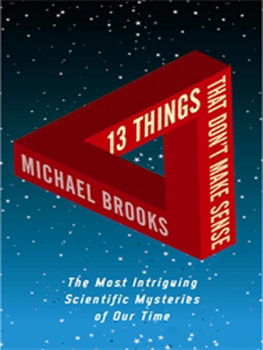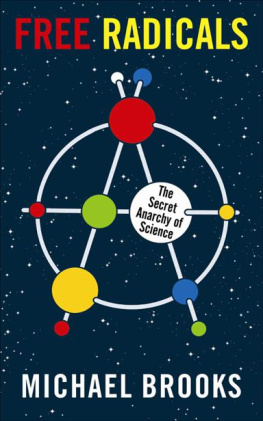Michael Brooks - The Big Questions: Physics
Here you can read online Michael Brooks - The Big Questions: Physics full text of the book (entire story) in english for free. Download pdf and epub, get meaning, cover and reviews about this ebook. year: 2013, publisher: Quercus, genre: Romance novel. Description of the work, (preface) as well as reviews are available. Best literature library LitArk.com created for fans of good reading and offers a wide selection of genres:
Romance novel
Science fiction
Adventure
Detective
Science
History
Home and family
Prose
Art
Politics
Computer
Non-fiction
Religion
Business
Children
Humor
Choose a favorite category and find really read worthwhile books. Enjoy immersion in the world of imagination, feel the emotions of the characters or learn something new for yourself, make an fascinating discovery.
- Book:The Big Questions: Physics
- Author:
- Publisher:Quercus
- Genre:
- Year:2013
- Rating:5 / 5
- Favourites:Add to favourites
- Your mark:
- 100
- 1
- 2
- 3
- 4
- 5
The Big Questions: Physics: summary, description and annotation
We offer to read an annotation, description, summary or preface (depends on what the author of the book "The Big Questions: Physics" wrote himself). If you haven't found the necessary information about the book — write in the comments, we will try to find it.
The Big Questions: Physics — read online for free the complete book (whole text) full work
Below is the text of the book, divided by pages. System saving the place of the last page read, allows you to conveniently read the book "The Big Questions: Physics" online for free, without having to search again every time where you left off. Put a bookmark, and you can go to the page where you finished reading at any time.
Font size:
Interval:
Bookmark:
Physics
Michael Brooks
SERIES EDITOR
Simon Blackburn

Quercus Publishing Plc
21 Bloomsbury Square, London, WC1A 2NS
First published in 2010
Copyright 2010 Michael Brooks
The moral right of Michael Brooks to be identified as the author of this work has been asserted in accordance with the Copyright, Design and Patents Act, 1988.
All rights reserved. No part of this publication may be reproduced, stored in a retrieval system, or transmitted in any form or by any means, electronic, mechanical, photocopying, recording, or otherwise, without the prior permission in writing of the copyright owner and publisher.
Every effort has been made to contact copyright holders. However, the publishers will be glad to rectify in future editions any inadvertent omissions brought to their attention.
Quercus Publishing Plc hereby exclude all liability to the extent permitted by law for any errors or omissions in this book and for any loss, damage or expense (whether direct or indirect) suffered by a third party relying on any information contained in this book.
A catalogue record of this book is available from the British Library
eBook ISBN 978 1 84916 608 9
Print ISBN
UK and associated territories: 978 1 84916 146 6
Canada: 978 1 84866 093 9
Designed by Patrick Nugent
All illustrations by Patrick Nugent except for p 137: Cepheus and p157: Jbourjai
10 9 8 7 6 5 4 3 2 1
You can find this and many other great books at:
www.quercusbooks.co.uk
Michael Brooks, author of the acclaimed
13 Things That Dont Make Sense, holds a PhD
in quantum physics. He is a journalist and
broadcaster, and acts as physics and cosmology
consultant to New Scientist magazine. He has
lectured at Cambridge University, the
American Museum of Natural History and
New York University, and his writing has
appeared in many national newspapers,
including the Guardian, the Independent,
the Observer and the Times Higher Education.
The Big Questions confronts the fundamental
problems of science and philosophy that have
perplexed enquiring minds throughout history, and
provides and explains the answers of our greatest
thinkers. This ambitious series is a unique, accessible
and concise distillation of humanitys best ideas.
Series editor Simon Blackburn is Professor of
Philosophy at the University of Cambridge,
Research Professor of Philosophy at the University
of North Carolina and one of the most
distinguished philosophers of our day.
Titles in The Big Questions series include:
PHILOSOPHY
PHYSICS
UNIVERSE
MATHEMATICS
The beauty of physics is summed up in one simple fact: a child can ask questions that no professor can answer. Indeed, searching out the big questions in physics is rather like looking for hay in a haystack. When it comes to physics, it appears there is no such thing as a small question. A seemingly insignificant query or experiment can often lead to profound insight.
It is a short step, for instance, from asking whether the laws of physics can ever change or be broken to wondering whether there is room for a creator. It doesnt stop there, either. Physics tells us a creator need not be divine; it could be that we live nested within an infinite number of universes, each created by a species only slightly more intelligent than its greatest creation. We may even be destined to become creators of a universe ourselves.
With such big issues at its fingertips, it is small wonder that the most iconic scientists of our generation have been immersed in physics. Albert Einstein became a celebrity almost overnight when his theory of relativity changed our conception of the universe. Carl Sagans TV programme Cosmos remains the most-watched series on public television. Richard Feynmans cool appraisal of the physics behind the Challenger shuttle disaster revealed how powerful a working knowledge of the subject can be. Stephen Hawkings work, laid out in his bestseller A Brief History of Time, created a thirst for scientific insight in people who had never given the sciences a thought. Only the discoverers of DNA, perhaps, can stand alongside these giants.
And yet, it has to be said, people also tend to recoil from physics. If I mention in casual conversation that I am a physicist by training, the announcement is met with a strange mixture of admiration and embarrassment. While expressing awe at anyone who would attempt to understand the universe, many also seem to consider the subject completely beyond them. Oh, they say, I never did understand physics.
If you recognize yourself in that statement, then hopefully this book will change your perspective. Perhaps the best-kept secret in physics is that there is too much there for anyone to understand. This is not a problem, however: this is the root of its allure.
Physics has so much to explore that, once it captures your imagination, it is hard to tear yourself away. The clock on the wall becomes a tease about the elusive nature of time. Sunshine is what results from a beautiful, intricate dance of particles known as nuclear fusion. When raindrops fall to the ground, you can ask yourself a simple why? Exploring the answer will keep you occupied through the longest thunderstorm. The way a sunflower grows speaks of the conservation of energy and how the nature of light has shaped life on Earth. Go a step further and ask what light is, and you are peering into something widely considered to be the deepest mystery in nature.
This book is designed to show how simple questions lead to some of the most profound discoveries that humanity has ever made. They encompass the physics you probably didnt learn in class: the real point of the subject; its implications; what we understand about the universe and what we dont. Carl Sagan once said, Somewhere, something incredible is waiting to be known. Hopefully, that process can begin here.
Impossible questions, unexpected rewards, and the never-ending quest for understanding
The question has bounced around school classrooms for decades. The answer offered usually starts with an apocryphal tale involving the legendary Greek philosopher Archimedes and King Hieros crown.
Hiero had come to the throne in the Sicilian city of Syracuse. He gave a craftsman a certain quantity of gold to fashion into a crown; when the crown arrived, so did a rumour that the craftsman had substituted some of the gold for silver. Hiero commissioned Archimedes, then in his early twenties, to find the truth.
The story, as related by the Roman writer Marcus Vitruvius Pollio, says that Archimedes realized how to solve the problem when he noticed the volume of water that his body displaced in a bath. Silver, being less dense than gold, would displace more water. Archimedes performed a series of experiments that involved submerging lumps of silver and gold that weighed the same as the crown to see how much water each one displaced. This enabled Archimedes to tell if there was silver in the crown. In his jubilation, Archimedes rushed down the street naked, shouting Eureka: I have found it.
Is this the point of physics: to answer seemingly unanswerable questions? We are now able to look at our surroundings across an extraordinary breadth of scales. Where we once thought visible matter to be indivisible, we have gone ).
Font size:
Interval:
Bookmark:
Similar books «The Big Questions: Physics»
Look at similar books to The Big Questions: Physics. We have selected literature similar in name and meaning in the hope of providing readers with more options to find new, interesting, not yet read works.
Discussion, reviews of the book The Big Questions: Physics and just readers' own opinions. Leave your comments, write what you think about the work, its meaning or the main characters. Specify what exactly you liked and what you didn't like, and why you think so.

